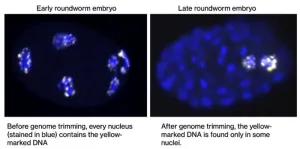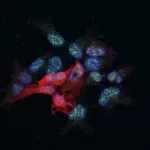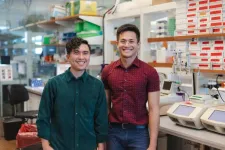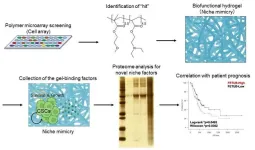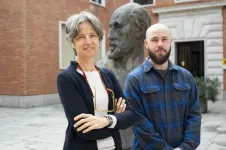(Press-News.org)
New research is underway to decipher a fascinating biological puzzle—how some animals can naturally discard more than half of their genetic information during embryonic development.
This radical natural phenomenon has captivated scientists for over 130 years, presenting a tantalizing question in the field of developmental biology and genetics.
Equipped with the latest in genetic engineering tools, the team at The University of Warwick is working to dissect the mechanisms behind this selective genomic editing. By uncovering the processes that allow some nematode worms to abandon up to 60% of the genetic material of some of their cells, the researchers hope to develop biotechnological tools that could enable large-scale, precise genomic alterations. These can be applied in different areas – from engineering models of hereditary diseases, helping to drive medical advancements and treatments, to improving crop resilience to harsh environmental conditions in the agricultural industry.
The new study is part of the Biotechnology and Biological Sciences Research Council’s (BBSRC) Pioneer Awards, which could revolutionise our understanding of the rules of life. Sixty two researchers across the UK, including Professor Andre Pires da Silva at the University of Warwick, are to receive a share of £12 million to pursue visionary bioscience research.
By drawing upon unconventional thinking and approaches, the investigators hope to make exciting discoveries with the potential to transform our understanding of the fundamental rules of life. These new investigations aim to radically change the way we think about important biological phenomena covering plant, microbial and animal sciences.
The investment by the Biotechnology and Biological Sciences Research Council’s (BBSRC) Pioneer Awards enables the pursuit of unique ideas that challenge current thinking and paradigms or open up entirely novel areas of exploration altogether.
Professor Andre Pires da Silva, School of Life Sciences, University of Warwick, said: “Funding opportunities for curiosity-driven studies have led to several important discoveries with practical applications. This includes the development of the polymerase chain reaction (PCR) technique, which is now widely used in biomedical research for amplifying DNA. The BBSRC is giving us a tremendous chance to explore a unique way of genome regulation, which may also help in building new tools to help areas such as medicine and agriculture.”
Professor Guy Poppy, Interim Executive Chair at BBSRC, added: “Understanding the fundamental rules of life, such as the principles governing genetics, evolution and biological processes, is essential for advancing scientific knowledge. It is also imperative to societal progress.
“Many of the challenges faced by today's society, such as global food security, environmental sustainability and healthcare, are deeply rooted in biological processes.
“BBSRC is committed to understanding the rules of life and by investing in cutting-edge discovery research through schemes such as the Pioneer Awards pilot, we are expanding the horizons of human knowledge while helping to unlock innovative bio-based solutions to some of the world's most pressing challenges.”
Notes to Editors
About the Pioneer Awards
BBSRC’s pilot pioneer awards scheme aimed to support original and potentially transformative research at an early stage of development. The scheme was designed to stimulate creativity within the bioscience research community by providing funding that encourages a ‘high-risk, high-reward’ research culture. The funded projects represent either a significant departure from existing lines of investigation within the research field or an entirely new line of inquiry.
Focused on BBSRC’s understanding the rules of life theme, the projects open up new research directions relevant to fundamental bioscience questions and have the potential to substantially shift current and future thinking about key topics.
The projects:
are original and visionary, challenging current thinking and paradigms
focus on exploring and revealing novel insights and theories relating to our fundamental understanding of biological systems
are early stage and untested, lacking preliminary data and perhaps involving creative or unconventional approaches to the research challenge
may involve a high level of uncertainty or require a range of exploratory investigations, such that while there are clear aims to explore, the outcomes are neither predictable nor guaranteed
involve any combination of experimental, analytical and theoretical work, potentially crossing disciplinary boundaries, including non-bioscience fields
A review of the pilot call is underway.
About BBSRC
BBSRC is part of UK Research and Innovation (UKRI) and invests in world-class bioscience research and training on behalf of the UK public. Our aim is to further scientific knowledge, to promote economic growth, wealth and job creation and to improve quality of life in the UK and beyond.
Funded by government, BBSRC invested £451 million in world-class bioscience in 2019-20. We support research and training in universities and strategically funded institutes. BBSRC research and the people we fund are helping society to meet major challenges, including food security, green energy and healthier, longer lives. Our investments underpin important UK economic sectors, such as farming, food, industrial biotechnology and pharmaceuticals.
Images
Media contact
University of Warwick press office contact:
Annie Slinn 07876876934
Communications Officer | Press & Media Relations | University of Warwick Email: annie.slinn@warwick.ac.uk
END
The enigma of embryonic development: How certain animals trim their genomes
New research is underway to decipher a fascinating biological puzzle—how some animals can naturally discard more than half of their genetic information during embryonic development.
2023-11-09
ELSE PRESS RELEASES FROM THIS DATE:
New URI lab developing adaptive technology, secures National Science Foundation grant
2023-11-09
New URI lab developing adaptive technology, secures National Science Foundation grant
Reza Abiri and Yalda Shahriari receive National Science Foundation award totaling $460,000 for work to improve stroke patient rehabilitation
Passing by Reza Abiri’s office at the University of Rhode Island, one might suspect him of nursing a serious coffee habit. A colorful collection of various mugs and cups dot his office, and though he is friendly enough to likely welcome any visitors stopping by to chat, the cups serve a larger purpose.
Abiri and Yalda Shahriari, professors in ...
MD Anderson announces Institute for Data Science in Oncology to advance mission to end cancer
2023-11-09
HOUSTON ― The University of Texas MD Anderson Cancer Center today announced the launch of its Institute for Data Science in Oncology (IDSO), which integrates the most advanced computational and data science approaches with the institution’s extensive scientific and clinical expertise to significantly improve patient’s lives by transforming cancer care and research.
Bringing top data scientists from a variety of fields together with clinicians and cancer scientists, the institute builds on MD Anderson’s culture of collaboration and connectivity to tackle the field’s most pressing needs in new and innovative ways. IDSO’s efforts have been catalyzed by philanthropic ...
Researchers decipher the mechanism by which the MAF protein promotes breast cancer metastasis
2023-11-09
The MAF protein interacts with the estrogen receptor, alters its function, and promotes the spread of cancer.
The KDM1A enzyme plays a fundamental role in the epigenetic remodelling that facilitates the function of pro-metastatic genes.
The work carried out in Dr. Roger Gomis Lab at IRB Barcelona has been published in the journal Nature Cell Biology.
Barcelona, 9 November 2023 – Breast cancer is the most common form of cancer among women, with more than 2 million new cases diagnosed each year. In cases where the tumour remains localised in the breast, survival rates are remarkably high, ...
New research: Fivefold increase in the melting of Greenland's glaciers over the last 20 years
2023-11-09
New research: Fivefold increase in the melting of Greenland's glaciers over the last 20 years
In the largest survey of its kind ever conducted, using both satellite imagery and old aerial photos from the Danish National Archives, researchers from the University of Copenhagen firmly establish that Greenland’s glaciers are melting at an unprecedented pace. Melting has increased fivefold in the past 20 years. The study eliminates any lingering doubts about the impact of climate change on Greenland's more than 20,000 glaciers.
Based on the most comprehensive monitoring ...
Drug screen points toward novel diabetes treatments
2023-11-09
A drug currently in clinical trials as a cancer therapy can also stimulate pancreatic beta cells to secrete insulin, revealing a previously unknown mechanism for insulin regulation in type 2 diabetes, according to a new study by Weill Cornell Medicine investigators. The preclinical discovery, reported Nov. 9 in Nature Chemical Biology, provides a new chemical tool for probing the biology of diabetes, and could point the way toward better treatments for the disease.
“We have known about insulin for a century, but when it comes to the major mechanisms controlling insulin secretion, there ...
Team creates synthetic enzymes to unravel molecular mysteries
2023-11-09
A University of Texas at Dallas bioengineer has developed synthetic enzymes that can control the behavior of the signaling protein Vg1, which plays a key role in the development of muscle, bone and blood in vertebrate embryos.
The team of researchers is using a new approach, called the Synthetic Processing (SynPro) system, in zebrafish to study how Vg1 is formed. By learning the molecular rules of signal formation in a developing animal, researchers aim to engineer mechanisms — such as giving cells new instructions — that could play a role in treating or preventing disease.
Dr. P.C. Dave P. Dingal, assistant professor of bioengineering in the Erik Jonsson ...
Finding your niche: A synthetic cancer stem cell microenvironment
2023-11-09
Researchers from Tokyo Medical and Dental University (TMDU) report the construction of a synthetic polymer biomaterial that successfully recapitulates the pancreatic adenocarcinoma microenvironment and could be used to identify novel treatment targets
Tokyo, Japan – One of the biggest challenges in biomedical research is finding a way to capture the complexity of the human body in laboratory-based techniques, to enable them to be investigated accurately. Now, researchers from Japan report an approach for precisely imitating a key feature of aggressive cancers in the laboratory.
In a study published recently in Inflammation and Regeneration, researchers from Tokyo Medical and ...
Vigorous exercise, rigorous science: What scientists learned from firefighters in training
2023-11-09
The 11 young firefighters went through a rigorous training exercise, carrying up to 40 pounds of gear over hilly terrain during a 45-minute training exercise in the California sun. Gloves, helmets, flashlights, goggles, and more weighted them down as they sprinted through the countryside wearing fire-resistant clothing to show they were ready to serve as wildland firefighters.
When the training was over, they immediately went to the medical tent—not to rest and recover but to give samples of their blood, ...
Study reveals the structure of brain waves associated with memory consolidation
2023-11-09
The reactivation of patterns of neuronal activity based on experience is crucial for learning and memory, but these patterns and the associated brain waves vary widely and are difficult to classify. Such events, dubbed ripples, are characteristic of the hippocampus, a brain region responsible for memory. Until now, the most common way to study ripples was using frequency analysis, but a project led by the Spanish National Research Council (CSIC) has proposed a new classification strategy.
Using data science tools, a research group from the Instituto Cajal (IC-CSIC) headed by Liset M. de la Prida has managed to figure out the temporal structure of hippocampal ripples. The scientists ...
Reducing vitamin B5 slows breast cancer growth in mice
2023-11-09
Francis Crick Institute press release
Under strict embargo: 16:00hrs GMT Thursday 9 November 2023
Peer reviewed
Experimental study
People and animals
Reducing vitamin B5 slows breast cancer growth in mice
A group of researchers led by the Francis Crick Institute, working with the National Physical Laboratory (NPL) and Imperial College London, have discovered that breast cancer cells expressing a cancer-driving gene heavily rely on vitamin B5 to grow and survive. The researchers are part of Cancer Grand Challenges team Rosetta, funded by Cancer Research UK.
In their research published today in Nature Metabolism, the team studied the metabolic effects of one of the major cancer-driving ...
LAST 30 PRESS RELEASES:
ASU researchers to lead AAAS panel on water insecurity in the United States
ASU professor Anne Stone to present at AAAS Conference in Phoenix on ancient origins of modern disease
Proposals for exploring viruses and skin as the next experimental quantum frontiers share US$30,000 science award
ASU researchers showcase scalable tech solutions for older adults living alone with cognitive decline at AAAS 2026
Scientists identify smooth regional trends in fruit fly survival strategies
Antipathy toward snakes? Your parents likely talked you into that at an early age
Sylvester Cancer Tip Sheet for Feb. 2026
Online exposure to medical misinformation concentrated among older adults
Telehealth improves access to genetic services for adult survivors of childhood cancers
Outdated mortality benchmarks risk missing early signs of famine and delay recognizing mass starvation
Newly discovered bacterium converts carbon dioxide into chemicals using electricity
Flipping and reversing mini-proteins could improve disease treatment
Scientists reveal major hidden source of atmospheric nitrogen pollution in fragile lake basin
Biochar emerges as a powerful tool for soil carbon neutrality and climate mitigation
Tiny cell messengers show big promise for safer protein and gene delivery
AMS releases statement regarding the decision to rescind EPA’s 2009 Endangerment Finding
Parents’ alcohol and drug use influences their children’s consumption, research shows
Modular assembly of chiral nitrogen-bridged rings achieved by palladium-catalyzed diastereoselective and enantioselective cascade cyclization reactions
Promoting civic engagement
AMS Science Preview: Hurricane slowdown, school snow days
Deforestation in the Amazon raises the surface temperature by 3 °C during the dry season
Model more accurately maps the impact of frost on corn crops
How did humans develop sharp vision? Lab-grown retinas show likely answer
Sour grapes? Taste, experience of sour foods depends on individual consumer
At AAAS, professor Krystal Tsosie argues the future of science must be Indigenous-led
From the lab to the living room: Decoding Parkinson’s patients movements in the real world
Research advances in porous materials, as highlighted in the 2025 Nobel Prize in Chemistry
Sally C. Morton, executive vice president of ASU Knowledge Enterprise, presents a bold and practical framework for moving research from discovery to real-world impact
Biochemical parameters in patients with diabetic nephropathy versus individuals with diabetes alone, non-diabetic nephropathy, and healthy controls
Muscular strength and mortality in women ages 63 to 99
[Press-News.org] The enigma of embryonic development: How certain animals trim their genomesNew research is underway to decipher a fascinating biological puzzle—how some animals can naturally discard more than half of their genetic information during embryonic development.
